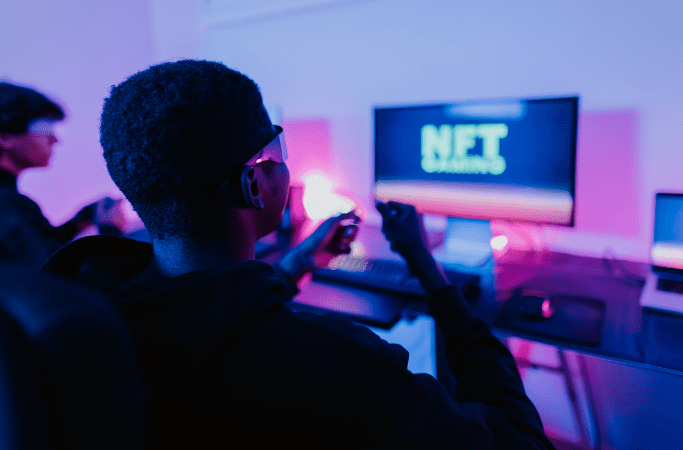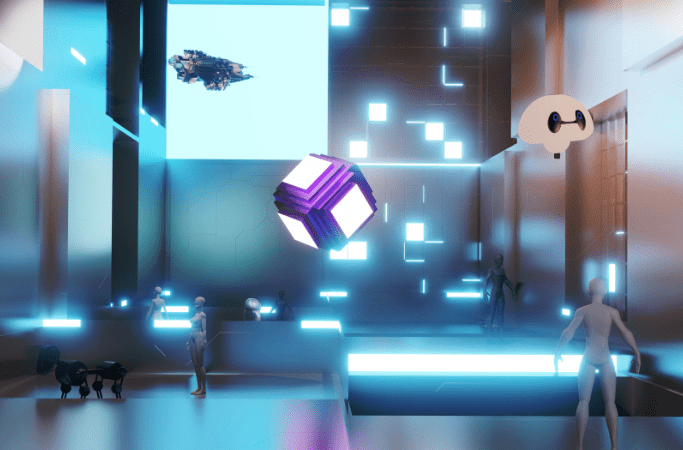The integration of blockchain technology in the gaming industry has been a game-changer. It’s transforming how games are played, developed, and monetized. This shift is not just a trend but a substantial change in the gaming ecosystem, promising a new era of digital assets, in-game transactions, and player empowerment.
What is Blockchain and How Does it Impact Games?

At the heart of blockchain technology lies a decentralized network, key in enhancing security and transparency in digital transactions. This network operates on advanced data encryption techniques, safeguarding user data and ensuring a secure environment for transactions. In the gaming world, blockchain brings revolutionary features like smart contracts and non-fungible tokens (NFTs). These elements drastically change how in-game assets are managed, making them more secure, unique, and valuable.
Distinct from traditional gaming, blockchain-based games introduce a unique economic model. They offer players the chance to earn real-life money, leveraging crypto token transactions. This approach allows gamers to gain financial rewards for their gaming skills and strategies. The play-to-earn model, underpinned by blockchain, transforms gaming from a purely recreational activity into a potential income source, blending the virtual gaming world with the real-world economy.
Also Read: All You Must Know About Chain Games
The Rise of NFT and Crypto Games

NFT games are a significant part of this revolution. These virtual games utilize non-fungible tokens to represent unique in-game items, providing monetary value and player ownership. Crypto games extend this concept, integrating cryptocurrencies for in-game purchases and rewarding players with crypto tokens.
From Traditional Gaming to Blockchain-Based Games

In the gaming world, a clear divide exists between traditional and blockchain-based gaming. Traditional games predominantly operate on centralized servers, where control over game mechanics and in-game assets is tightly held by game developers or publishers. This centralized approach often restricts player autonomy, limiting their ability to influence or own significant aspects of their gaming experience. Players’ in-game achievements and assets, under this system, remain under the control of the central server, offering limited real-world value.
Conversely, blockchain gaming introduces a paradigm shift with its persistent platforms. These platforms democratize asset control, enabling players to truly own, buy, sell, and trade their in-game assets freely on the blockchain. This level of freedom and control is unprecedented in traditional gaming. Blockchain technology empowers players by granting them real ownership of their digital assets, which can carry significant value both within and outside the game universe. This transition to a player-centric model is redefining what it means to engage with and invest in a gaming experience.
Game Developers: Embracing the New Era
Game developers are increasingly accepting blockchain games, recognizing the potential for a more immersive gaming experience. Blockchain game developers are exploring new ways to incorporate smart contract execution results into gameplay, enhancing the fun game element.
Online Gaming and Blockchain Networks

In the evolving landscape of online gaming, blockchain networks have introduced a groundbreaking dimension. These networks revolutionize the gaming experience by ensuring secure and transparent in-game transactions. This is a notable shift from the traditional gaming frameworks, where transaction histories were often opaque and centralized. Blockchain’s inherent transparency and security features offer players a level of trust and fairness previously unattainable in online gaming.
The stark contrast between blockchain networks and traditional gaming platforms lies in the handling of transactions and player data. In conventional online games, transactions and player histories are stored on centralized servers, posing risks of data breaches and manipulation. Blockchain, however, distributes this data across a decentralized network, significantly mitigating these risks. This approach not only protects players’ assets and histories but also fosters a more equitable gaming environment, free from the control of any single authority.
The Future of Gaming

The blockchain gaming industry is poised for exponential growth, driven by technological advancements and increasing player interest. This growth is not just in numbers but in the depth and variety of gaming experiences offered. Blockchain-based games are evolving beyond traditional gameplay, introducing innovative concepts that integrate gaming with real-world value. This integration is redefining entertainment, blending immersive gaming with economic incentives.
At the forefront of this transformation is the play-to-earn model, a groundbreaking approach in the gaming world. This model allows players to earn tangible rewards, often in the form of cryptocurrencies or valuable digital assets, for their time and skill invested in the game. It’s a significant shift from conventional gaming, where rewards were confined within the digital realm. This new model is not only attracting a broader audience but is also creating a novel way for gamers to earn income, thereby merging entertainment with financial opportunity.
Conclusion
The blockchain in the gaming movement is not just a phase; it’s a revolution. With its promise of a more secure, decentralized, and player-centric world, the gaming industry is on the brink of a major transformation. From game developers to players, everyone is poised to experience a new era of digital entertainment, where virtual reality, smart contracts, and digital assets redefine what it means to play and enjoy games.
Also Read: Wrapped Bitcoin: All You Must Know
FAQs
What are the key differences between traditional and blockchain-based games?
Traditional games are typically centralized, meaning all data and in-game transactions are controlled by game developers or publishers. Players have limited control over in-game assets. In contrast, blockchain-based games operate on decentralized networks, offering players real ownership, and the ability to freely trade and sell their in-game assets.
How do blockchain games provide real-life earning opportunities?
Blockchain games often feature a play-to-earn model, where players can earn cryptocurrencies or valuable digital assets for their in-game activities. These assets can often be traded on various platforms for real money, providing players with a source of income.
Are transactions in blockchain games secure?
Yes, transactions in blockchain games are secure, thanks to the underlying blockchain technology. This technology provides a transparent, immutable ledger for transactions, and employs advanced encryption to protect data, making in-game transactions and asset ownership both secure and transparent.



